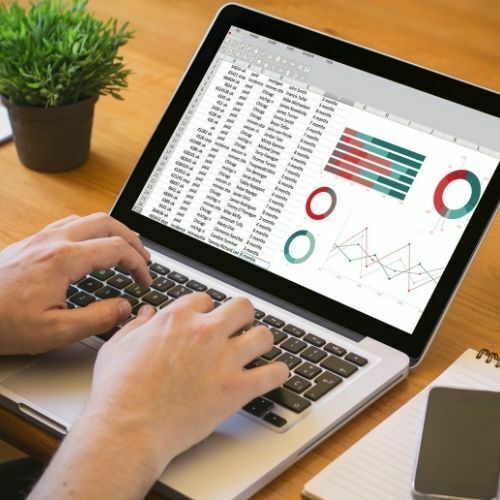There was once a time when using a spreadsheet could be considered the best way to track your IT assets. This is when spreadsheets used to be one of the most advanced software applications in the world. Of course, that time is long gone.
As technology develops, businesses are incorporating modern solutions that let them perform their day-to-day tasks better. In that regard, IT asset management software has replaced spreadsheets for asset management. This is simply because asset tracking software is a quicker, easier, more technologically advanced and economical option to track your IT assets.
Today, spreadsheets are no longer the best method for asset tracking. If you want to keep up with the rest of the business world, you must do what the best-in-the-business do: use IT asset management.
More About Spreadsheets
Spreadsheets are used by 71% of businesses around the world. That’s a huge percentage, and rightly so because there’s no other tool as useful as the good old spreadsheet. It’s a universal application, used by employees of all levels from the office intern right up to the chief executive of a company.
Popular spreadsheet apps like Microsoft Excel or Google Sheets are examples of generalist apps that different companies use for a wide range of purposes. They can be used for accounting, project management, attendance, asset management and much more. Doing so, spreadsheets can prove to be pretty useful for small-to-medium-sized businesses which don’t have a lot of specific requirements.
However, as a business grows and develops complex requirements, spreadsheets cease to be the universal solution for all of its problems. For large scale businesses, spreadsheets may even become a hindrance in the way to sustainable growth. At this point, an enterprise needs to have a more sophisticated and specialised solution so it can carry out its tasks better.
When it comes to asset management, you can only manage to perform the most basic asset tracking activities with spreadsheets. And that’s if you have no more than a dozen assets. If you’ve got more than that, you’d have really messy sheets that are horrible to work with.
IT Asset Management Vs. Spreadsheets
This section will talk about five reasons why asset tracking software is better than spreadsheets.
1. Spreadsheets are Prone to Errors
To put it out there, spreadsheets were created to store data. They are not made for asset tracking. Particularly because there’s no space for errors in asset management, but one can make plenty of them using spreadsheets. There’s an error in 90% of all spreadsheets, which is nothing less than a disaster when it comes to asset tracking.
Spreadsheets are prone to this many errors mainly because an employee updates them according to what they know. Oftentimes, different employees have different information about an asset, and with no space for collaboration, spreadsheets lead to a lot of errors, misunderstandings and confusion.
2. Spreadsheets are Hard to Update
One of the most fundamental requirements for your businesses’ asset tracking to work is for your asset register to be up to date. An outdated asset register is no better than not having one at all.
As it happens, spreadsheets cannot be updated as efficiently. The monotonous process of finding each cell and re-entering updated data is overwhelming. On the other hand, IT asset management software offers a much better solution to keep your asset register updated at all times.
3. Spreadsheets Don’t Let You Attach Files
When tracking a wide range of assets, you might often need to attach different file types like photos or videos to the asset register. This cannot be done with spreadsheets.
Important files like asset purchase documents, photos and videos related to maintenance can easily be attached to individual asset profiles with an IT asset management software like itemit.
4. IT Asset Management Software is More Automated
There are various features that make asset tracking much more automated with itemit. Spreadsheets are just plain old sheets that have to be manually edited for each and every update. This can be a lot of work for the one person in charge of asset management.
With asset tracking software, keeping an up-to-date record of all asset details is much easier. When multiple employees can access and update the asset register, the responsibility gets shared across the team rather than resting on one person’s shoulders.
There are other ways how itemit automates asset tracking. For instance, each time an asset tag is scanned, the asset location gets automatically updated. In the same vein, when an employee marks an issue with an asset, the manager is automatically notified about the issue by the software.
5. IT Asset Management Software Tracks Assets in Real-time
With spreadsheets, all asset information that you see is from the past. More often than not, not all the information a spreadsheet gives you can be applied to the present because assets are in a constant phase of change. IT asset management software like itemit gives you real-time information about assets so you can be absolutely sure that the data you have is correct.
Each employee using an asset can keep the asset register updated with the latest changes as soon as they take place. In the same way, the location for each asset is kept updated automatically. The equipment checkout feature lets you see which items are out of the workplace and who has them.
Final Thoughts
In terms of efficiency and functionality, it’s pretty clear why IT asset management software is better than using spreadsheets. But you might still hold that using free spreadsheet software is more economical than investing in asset tracking software.
You’d be surprised to learn that the amount of time and resources you spend when tracking assets with spreadsheets is much more than the money and time you’d invest in asset tracking software. To learn more about how it saves you time and money, reach out to our team at team@itemit.com.
You can also take itemit on a test drive and use all of its features for yourself by filling in the form below and starting your 14-day free trial.
IT Asset Management
Choose a better way to track your assets
Start your free 14-day trial now
Instant access. No credit card details required.
Related articles
What Should You Log On IT Asset Register Software?
What assets and information should you log on IT asset register software? Find out how to track your fixed and IT assets in one streamlined system.
The Benefits Of IT Inventory management
Find out more about how you can use IT inventory management to save your business time and money. Track critical asset information with ease.
Why Use Hardware Asset Management Software?
Hardware asset management software gives you more visibility and control over your assets. Save a lot of time and a lot of money by using it.




